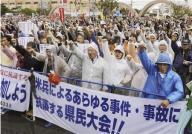Riding on the tide of emotion generated by the alleged rape of a 14 year-old girl last month, and coincidentally coinciding with reports of the stabbing and robbery of taxi drivers, two separate incidents with impeccably similar timing, last Sunday citizens in Okinawa held a rally protesting crime by U.S. soldiers. With a reported 6000 attendees, including a few faces from the National Diet, this was the largest anti-U.S. military demonstration since 1995 when the gang-rape of a 12 year-old girl ignited a similar protest.
 Protesters in Okinawa (Photo courtesy of Reuters)Domestic media outlets, quick to jump on any news that bears the scent of U.S. military crimes, have been providing ample coverage of the incidents leading up to the protest, but is their coverage of the rally itself as central as it could be? While it's easy to hear about assaults and rape committed by foreign military personnel and shake our heads in disdain, this simple gesture carries with it a hint of apathy and defeat. And while the U.S. military is sweating it out as usual, putting curfews into effect and increasing "anti-sexual violence education" for soldiers, this simple appeasement is hardly a solution for the long run.
Protesters in Okinawa (Photo courtesy of Reuters)Domestic media outlets, quick to jump on any news that bears the scent of U.S. military crimes, have been providing ample coverage of the incidents leading up to the protest, but is their coverage of the rally itself as central as it could be? While it's easy to hear about assaults and rape committed by foreign military personnel and shake our heads in disdain, this simple gesture carries with it a hint of apathy and defeat. And while the U.S. military is sweating it out as usual, putting curfews into effect and increasing "anti-sexual violence education" for soldiers, this simple appeasement is hardly a solution for the long run.
Through rallies like this, Okinawans, who have long been faced with "can't live with them, can't live without them" economic problem regarding the military, are demonstrating that they've had enough. Their anger proved to be productive in 1995, when the protest resulted in plans to redeploy several thousand soldiers to Guam. The U.S. has shown that they will buckle under pressure, and larger, more prominent demonstrations are one effective way to apply that pressure.
The media has the power to not only inform citizens of events and incidents, but also to sway public opinion and, in this case, further mar the already less than stellar image the U.S. military has in Japan. By using the rally in Okinawa to set an example, citizens in and around Yokosuka, where a 61 year-old taxi driver was reportedly stabbed by a serviceman last week, may find the courage to speak up about injustices that occur in their own area, further propelling the effort to get the Japan-U.S. Status of Forces Agreement revised, and send more troops back to U.S. territories.
Written by Sarah Noorbakhsh
Blog:
Other posts by Anna:





